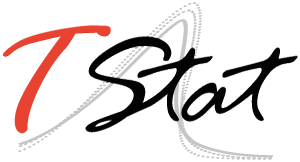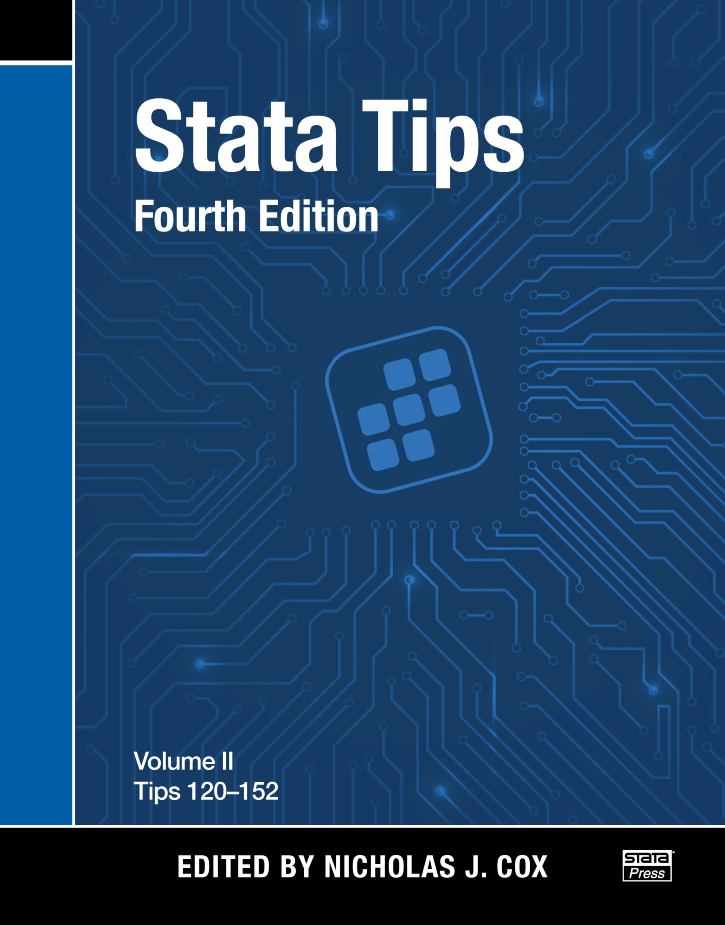Stata Tips provides concise and insightful notes about commands, features, and tricks that will help you obtain a deeper understanding of Stata.
The book comprises the contributions of the Stata community that have appeared in the Stata Journal since 2003. Each tip is a brief article that provides practical advice on using Stata. With tips covering a breadth of topics in statistics, graphics, data management, and programming, both new and experienced Stata users are sure to find tips that will be useful in their research.
- Stata tip 120: Certifying subroutines, M. L. Buis
- Stata tip 121: Box plots side by side, N. J. Cox
- Stata tip 122: Variable bar widths in two-way graphs, B. Jann
- Stata tip 123: Spell boundaries, N. J. Cox
- Stata tip 124: Passing temporary variables to subprograms, M. L. Buis
- Stata tip 125: Binned residual plots for assessing the fit of regression models for binary outcomes, J. Kasza
- Stata tip 126: Handling irregularly spaced high-frequency transactions data, C. F. Baum and S. Bibo
- Stata tip 127: Use capture noisily groups, R. B. Newson
- Stata tip 128: Marginal effects in log-transformed models: A trade application, L. J. Uberti
- Stata tip 129: Efficiently processing textual data with Stata’s new Unicode features, A. Koplenig
- Stata tip 130: 106610 and all that: Date variables that need to be fixed., N. J. Cox
- Stata tip 131: Custom legends for graphs that use translucency, T. P. Morris
- Stata tip 132: Tiny tricks and tips on ticks, N. J. Cox and V. Wiggins
- Stata tip 133: Box plots that show median and quartiles only, N. J. Cox
- Stata tip 134: Multiplicative and marginal interaction effects in nonlinear models, W. H. Dow, E. C. Norton, and J. T. Donahoe
- Stata tip 135: Leaps and bounds, M. L. Buis
- Stata tip 136: Between-group comparisons in a scatterplot with weighted markers, A. Musau
- Stata tip 137: Interpreting constraints on slopes of rank-deficient design matrices, D. Christodoulou
- Stata tip 138: Local macros have local scope, N. J. Cox
- Stata tip 139: The by() option of graph can work better than graph combine, N. J. Cox
- Stata tip 140: Shorter or fewer category labels with graph bar, N. J. Cox
- Stata tip 141: Adding marginal spike histograms to quantile and cumulative distribution plots, N. J. Cox
- Stata tip 142: joinby is the real merge m:m, D. Mazrekaj and J. Wursten
- Stata tip 143: Creating donut charts in Stata, A. Musau
- Stata tip 144: Adding variable text to graphs that use a by() option, N. J. Cox
- Stata tip 145: Numbering weeks within months, N. J. Cox
- Stata tip 146: Using margins after a Poisson regression model to estimate the number of events prevented by an intervention, M. Falcaro, R. B. Newson, and P. Sasieni
- Erratum: Stata tip 145: Numbering weeks within months, N. J. Cox
- Stata tip 147: Porting downloaded packages between machines, R. B. Newson
- Stata tip 148: Searching for words within strings, N. J. Cox
- Stata tip 149: Weighted estimation of fixed-effects and first-differences models, J. Gardner
- Stata tip 150: When is it appropriate to xtset a panel dataset with panelvar only? C. Lazzaro
- Stata tip 151: Puzzling out some logical operators, N. J. Cox
- Stata tip 152: if and if: When to use the if qualifier and when to use the if command, N. J. Cox and C. B. Schechter


